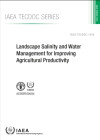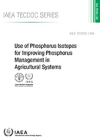International Symposium on Isotope Hydrology
3–7 July 2023, Vienna, Austria
Background
The International Atomic Energy Agency (IAEA) has convened quadrennial symposia on isotope hydrology since 1963. In 2023 this symposium will celebrate 60 years of providing a unique opportunity to review the state-of-the-science, practical applications, and research trends and needs in isotope hydrology. Isotope hydrology contributes to a better understanding of the water cycle and has applications in water resources assessment and management, the study of past and future changes in the Earth’s climate as well as of climate impacts on the water cycle, and in forensic areas such as ecological, wildlife and food source traceability. This edition is the 16th symposium in the series and will be held at the IAEA’s Headquarters in Vienna, Austria. The symposium is aimed at facilitating the exchange of information and knowledge among water and environment professionals from developed and developing countries.
Purpose and Objectives
The objectives of the symposium are to:
- review the basic principles of isotope hydrology in the light of the current state of knowledge;
- review recent developments in analytical instrumentation and applications of isotopes in water and climate studies;
- identify research, analytical and training requirements for a wider use of isotope hydrology; and
- identify particular focus areas where isotope hydrology can assist with acceleration of SDG6.
Themes and Topics
The symposium will cover the following topics related to the application of isotope hydrology for water resource management:
- Revisiting the role of tritium as a tracer in post-bomb hydrological cycle processes and groundwater systems
- Hydrosphere–atmosphere interactions including isotopic insights on meteorological extremes, convective rains and catchment runoff
- Assessing changes in the cryosphere and their impact on water sustainability and security
- Evaluating water quality, tracking contaminant sources and reaction pathways in different environmental systems including areas affected by mining and agricultural activities.
- Application of isotope age tracers to evaluate sub-annual to 1 Ma water residence time
- New analytical developments, approaches, and tools in isotopologue ratio measurement and data quality
- Integrating isotope techniques with other advanced techniques such as big data from remote sensing or high-frequency sensors, advanced data analysis using geographic information systems, machine learning and/or modelling applications
- Isotopic reflections on water resources due to climate change including adaptation and mitigation approaches
- Enabling and strengthening science-based policies for water resource management
- Actions and activities that support capacity building and mainstreaming of gender equality in isotope hydrology projects
Structure
- An opening session consisting of welcoming addresses by representatives of the IAEA and cooperating organizations
- Plenary sessions including keynote speakers
- Scientific sessions consisting of oral presentations from the different themes/topics under Section C
- Discussion sessions at the end of each major theme or topic
- Poster sessions consisting of poster presentations including ample time for discussion and interaction with colleagues
- A final roundtable session including presentations addressing the main conclusions drawn from the scientific sessions and will discuss recommendations for the future development of international cooperation, including IAEA activities in isotope hydrology
- Rapporteur summaries for all major sessions/themes
- Side events including workshops and training sessions relevant to isotope hydrology.
Target Audience
The symposium is aimed at professionals involved in a broad spectrum of disciplines, including water resource management, processes in the hydrosphere and atmosphere, climate change and its impact on the water cycle, environmental modelling, protection of the environment, geographical information systems, emergency response, and the development of isotopic techniques and tools. Government officials, including policy makers and individuals responsible for the assessment of environmental programmes, would also benefit from attending the symposium.
Extended Key Deadlines and Dates
30 January 202317 February 2023: Submission of synopses through IAEA-INDICO30 January 202317 February 2023: Submission of Form B (together with Form A) through the InTouch+ platform30 January 202317 February 2023: Submission of Form C (together with Form A) through the InTouch+ platform- after 15 March 2023: Notification of acceptance of synopses for oral or poster presentation
- No deadline: Submission of Form A only (no paper submission, no grant request) through the InTouch+ platform
Greening
To demonstrate its commitment to sustainability, the IAEA will organize this conference as a 'green meeting' according to the guidelines of the Austrian Ecolabel.
There will be a focus on the areas of paper smart documentation, waste reduction and recycling, and environmentally friendly catering.
Conference app
The IAEA Conferences and Meetings App provides a one-stop access to information on the Conference, exhibitions and scheduled side events. The app also allows users to put together their own personalized schedule of events. Via this app participants will be able to view contributed papers and the latest conference programme, message other participants, and view PowerPoint presentations released after the event. Participants will receive an email inviting them to register for the app approximately one week before the conference.







